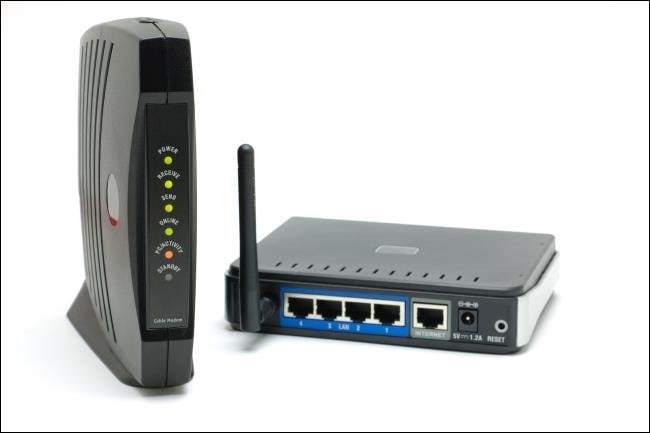Modem vs. Router

The necessity for a quality router has certainly not been better. In today’s linked world, virtually each home is filled with phones, PCs, smart Televisions, & numerous other devices, all struggling for bandwidth. Your Internet Service Provider can try to offer you their router, still it's almost a surety that it will be high-priced & will disappoint. If you choose a router which provides better output, range, plus features, looks for some top options.
Modem vs. Router: How they differ and What They Do
Here's how routers & modems work together & why they're kept best separate
While it's time to set up a house Wi-Fi network, it's essential to exactly know what type of tools you require. And one of the foremost steps for choosing the right gear understands the differences on modem vs. router.
Finally, those are the 2 pieces of network gear where everything begins with. A modem brings net into the household, whereas a router which directs that net connection to all the PCs, tabs, cell phones & various linked devices you have close by. The 2 devices collaborate to fill your home with Snapchats, cat videos, & all the various things which make the web so fantastic.
Below are the best Wi-Fi routers you can purchase
What net speed do I require? How much Mbps are ample?
Below is a quick listing of both kinds of networking tool, plus what to search for & why you're mostly comfortable choosing for a separate modem or router rather than a mix device.
Modem: The gateway to the net
To get the net into your house, you're going to require a modem.
This is a tiny gadget which links to the ISP to tap into all that net virtuousness. The link is made thru a wire (for fibre or cable net) or telephone lines (DSL) from external your home which plugs into the rear of the modem. The modem shares this linking with a PC or a router through an Ethernet line.
Modem is not one-size-fit-all solution; the kind of modem you'll require depend on the kind of net service you get. If that is DSL, you will require a DSL modem. If the ISP supplies cable net, you will need a cable modem. If you opt fiber, you'll receive an optical networks terminal (ONT) to convert the fibre-optic light signals to electrical signals which your appliances will identify, & perhaps another modem-like tool to decode from the ONT.
Numerous ISPs provide both cable/DSL & fibre choices, so it may be interesting to know what kind of modem you require for your net service even when you are considering at just one provider. If that makes your head spin, the good news is that your Internet Service Provider will inform you what kind of modem you require, & will even provide one for you to lease or, in few instances, purchase.
A warning on leasing your modem, although: It will cost you. Whereas tacking around $14 a month on to the bills every month might not look like much, those expenses total over time. At Comcast, where few clients are paying is $14 fee monthly for the modems, which is $168 yearly you're paying in modem leasing charges. Believing that top cable modems charge anywhere between $60 till $100, you may repay a modem two times for what you're expending to lease one.
To purchase the own modem, all you require to do is checking with the ISP to ensure that the model you wish to purchase works with that service provider. If you find cable net, a modem DOCSIS 3.0 like the Netgear CM500 or Motorola MB7420 will control speeds for maximum households. If the net service has speeds more than 300Mbps, take into account a modem of high-speed DOCSIS 3.0 rather for example the Netgear CM600.
Routers: Taking the wireless web
Choosing a modem is just partly the battle, since they usually offer connections for simply a single, connected device. If you wish to go wireless, you're going to require a router, that is an interacting device which allows you sharing the modem's net connection with all the devices. Routers link to the modem thru an Ethernet line & pass that net connection on to additional devices in your home whichever thru an added Ethernet wire or wirelessly on a Wi-Fi network.
Routers are available in 2 prime alternatives: traditional single-unit routers & complete -home Wi-Fi routers which use numerous devices to produce a entangle network which covers your Wi-Fi signal. For small houses, single-unit routers usually offer a good enough signal to run a clear-cut wireless connection to all angles of your house. Plus if they don't, you may always choose one of the top Wi-Fi extenders.)
For bigger households, entire-house Wi-Fi web networks are the great option. These web routers substitute a single router with numerous Wi-Fi points (named nodes). Placed well all over your house, they link together effortlessly to blanket your house with wireless coverage, devoid of any speed loss or covering dead spots.
As through cable modems, we've observed all kinds of routers & may suggest the top router for your house, with preferences based on in general performance, range, cost & how fine the router manages online gaming. Router requires may vary from house to house, still the AX8 Netgear Nighthawk has ruled the recent testing performance.
An appropriately executed mesh network can be leaps & bounds better than a usual router with a low-priced range promoter. Whereas these range boosters make it appear like you have great signals all around your home, they nearly always provide awful speeds & poor dependability. Today's web systems use complex routing algorithms to keep high speeds also at range. They normally use devoted channels for inner backhaul, whereas basic extenders leech off the key connection.